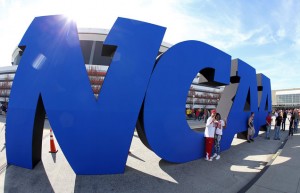
The NCAA and, more recently, the Power Five conferences have begged Congress for an antitrust exemption based on numerous prior lawsuits that have allegedly served to drain their resources. A new 95-page complaint filed in the U.S. District Court for the Northern District of California may add fuel to their fire, even though legislators like Representative Anthony Gonzalez have made it clear that they are not in favor of providing the NCAA the type of blanket relief requested.
The action was brought by Arizona State swimming and diving team member Grant House and Oregon women’s basketball player Sedona Price, who are represented by law firm Hagens Berman. They claim that the NCAA and Power Five conferences have violated federal antitrust laws by prohibiting college athletes from receiving any consideration in exchange for the use of their names, images, and likenesses (NIL).
On June 12, Florida Governor Ron DeSantis signed into law a bill that will allow college athletes in Florida to have those very rights beginning on July 1, 2021, irrespective of whether the NCAA or the Power Five conferences change their current restrictions. However, that is just one state and does not do anything to alter the current landscape, which has prevented college athletes from partaking in an economic system where everyone is earning money except for them.
The lawsuit brought by House and Price begins with a focus on current NBA player Zion Williamson, who was a star during his one year at Duke University. Yet, Williamson was unable to capitalize off of his athletic prowess while Duke was earning millions of dollars from its sponsorship contract with Nike.
The relief requested by the plaintiff is in the form of an injunction that will remove NCAA rules that currently prohibit college athletes from earning compensation from the use of their names, images, and likenesses, as well as monetary damages based on the monies that they should have received in the past for the use of their images on social media and through television rights deals.
“[I]n a system where billions of dollars are generated primarily off the backs (literally, when sponsor[s] pay to outfit student-athletes with branded equipment and apparel) and athletic successes of student-athletes, the restrictions on NIL compensation do not prevent exploitation — they are exploitative … The unfairness in this arrangement grows exponentially with each new multi-million (or multi-billion) dollar television and sponsorship deal, coaching contract, and facility construction, while the selective and blanket restrictions on student-athletes are maintained,” states the complaint.
One industry that would likely engage many college athletes in endorsement deals is composed of shoe and apparel companies such as Nike, Adidas, and Under Armour. The complaint says that, as of 2019, those companies had exclusive rights to outfit 97% of all Division I football and basketball programs, earning schools and coaches millions of dollars annually in income and noncash benefits. Meanwhile, college athletes cannot currently take advantage of similar economic relationships.
The complaint was filed with the intention of being converted into a class action, which seeks to include current or former college athletes who were active for any period since June 15, 2016.
Darren Heitner is the founder of Heitner Legal. He is the author of How to Play the Game: What Every Sports Attorney Needs to Know, published by the American Bar Association, and is an adjunct professor at the University of Florida Levin College of Law. You can reach him by email at heitner@gmail.com and follow him on Twitter at @DarrenHeitner.

